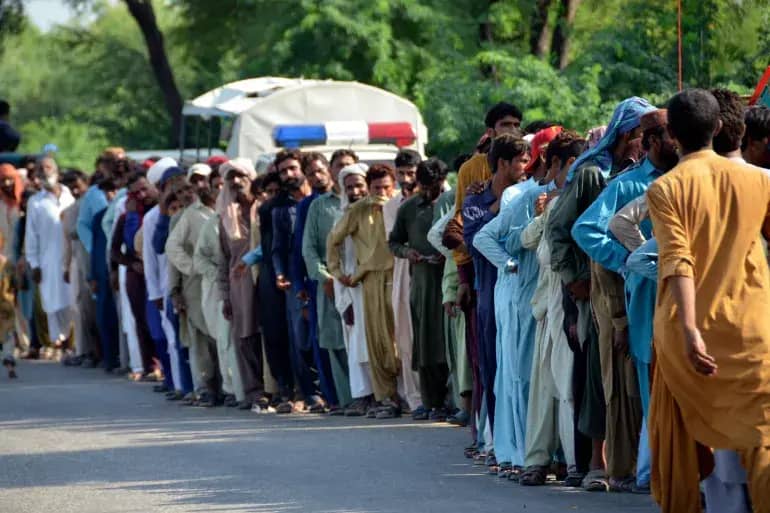Inflation is an economic phenomenon that affects nations worldwide, and Pakistan is no exception. Over the past few years, the country has experienced high levels of inflation, burdening its citizens and impacting their purchasing power. In this blog, we delve into the primary factors behind Pakistan’s high inflation and explore potential solutions to alleviate its adverse effects.
The Causes of High Inflation in Pakistan
There are a number of factors that have contributed to high inflation in Pakistan. These include:
An energy crisis: Pakistan faces a persistent energy crisis, marked by frequent power outages and an over-reliance on imported energy. This energy deficit drives up production costs, leading to higher prices for essential goods and services.
Currency devaluation:
The depreciating value of the Pakistani rupee against major international currencies, such as the US dollar, contributes significantly to inflation. As the value of the rupee decreases, the cost of imported goods and raw materials rises, leading to higher prices for consumers across various sectors.
Fiscal mismanagement and excessive borrowing:
Pakistan’s fiscal mismanagement has played a crucial role in exacerbating inflationary pressures. The government’s reckless borrowing to finance budget deficits crowds out private sector investments, increases reliance on the central bank for funding, and elevates inflationary risks.
Supply and demand imbalances:
Supply-chain disruptions and distribution inefficiencies contribute to inflation by creating a mismatch between supply and demand. Factors such as poor infrastructure, inadequate storage facilities, and a lack of investment in agriculture lead to food shortages and price hikes. Similarly, the limited availability of affordable housing, coupled with increasing urbanization, contributes to rising property prices.
Uncontrolled money supply:
A rapid increase in the money supply without corresponding growth in the real economy fuels inflation. The excessive printing of money adds more currency into circulation, driving up aggregate demand without a commensurate increase in the supply of goods and services. Until measures are taken to curtail money supply growth and address structural issues within the economy, inflationary pressures are likely to persist.
Solutions to High Inflation in Pakistan
The high inflation in Pakistan is a multifaceted challenge requiring a comprehensive and coordinated approach to address its underlying causes. Some potential solutions include:
Implementing long-term energy solutions
One of the most important steps that Pakistan can take to address inflation is to implement long-term energy solutions. This would help reduce the country’s reliance on imported energy and stabilize energy prices.
There are a number of different energy solutions that Pakistan could pursue, such as developing renewable energy sources, improving energy efficiency, and promoting energy conservation. Each of these solutions has its own advantages and disadvantages, and the best approach will depend on the specific circumstances of Pakistan.
Stabilizing the currency
Another important step that Pakistan can take to address inflation is to stabilize the currency. This would help reduce the cost of imported goods and raw materials, which would in turn help lower inflation.
The Pakistani rupee has been depreciating against major international currencies in recent years, which has contributed to inflation. There are a number of factors that have contributed to the depreciation of the rupee, such as the current account deficit, political instability, and uncertainty about the future of the economy.
The government of Pakistan has taken some steps to stabilize the currency, such as raising interest rates and imposing capital controls. However, these measures have had limited success so far.
Prioritizing fiscal discipline
The government of Pakistan also needs to prioritize fiscal discipline in order to address inflation. This means reducing the government’s budget deficits and reliance on debt financing.
The government’s budget deficits have been widening in recent years, which has put pressure on the currency and contributed to inflation. The government needs to take steps to reduce its spending and increase its revenue in order to balance the budget.
Improving agricultural practices
Pakistan is a major agricultural country, and the agricultural sector plays a vital role in the economy. However, the agricultural sector is also one of the most inefficient sectors in the economy.
The government of Pakistan needs to take steps to improve agricultural practices in order to increase the supply of food and reduce food prices. This could be done by providing farmers with access to better seeds, fertilizers, and irrigation systems.
Adopting prudent monetary policies
The central bank of Pakistan also needs to adopt prudent monetary policies in order to address inflation. This means controlling the growth of the money supply and preventing inflation from spiralling out of control.
The central bank has raised interest rates in recent months in an effort to control inflation. However, it is important to note that interest rate hikes can have a negative impact on economic growth.
The government and the central bank of Pakistan need to work together to address the underlying causes of inflation and implement solutions that will help alleviate its adverse effects.
Conclusion
High inflation in Pakistan is a serious problem that has a significant impact on the lives of ordinary citizens. The government and other stakeholders need to take urgent action to address the underlying causes of inflation and implement solutions that will help alleviate its adverse effects.
